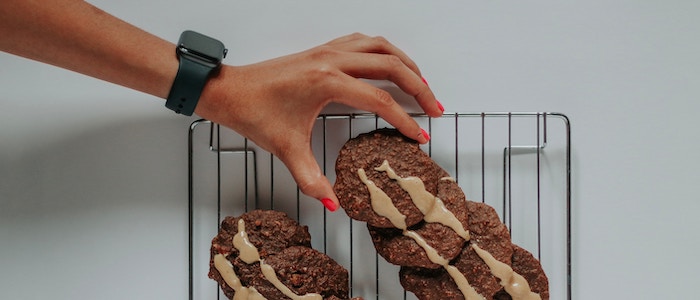Are you a stress eater?
We all react differently to pressures and challenges in our lives. It’s for this reason that stress manifests itself differently in each of us.

We tend to pay a lot of attention to the physical signs of stress; insomnia, depression, fatigue, headaches and irritability. But, stress can impact us in other ways – notably, affecting the choices we make around food. It’s not only what we choose to eat, but also why we’re choosing these foods that we should be aware of.
What is stress eating?
We know that stress can wreak havoc on our bodies, particularly our stomachs. Some people may suffer from an upset stomach or digestive problems as a symptom of stress.
But, stress also has implications on our food choices. You may find that your strongest food cravings often hit when you’re at your most stressed or at a low point emotionally. As a result, we tend to turn to food for comfort, either consciously or subconsciously.
Maybe you recognise some of the following in your relationship with food:
- You eat more when you’re feeling stressed.
- You eat when you’re not hungry or when you’re full.
- You eat to feel better, for instance, to calm and soothe yourself when you’re upset, angry, bored, anxious, etc.
- You reward yourself with food.
- You regularly eat until you feel stuffed.
- Food makes you feel safe.
- You feel powerless or out of control around food.
Why do we stress eat?
Our hormones are often the main culprit here. When we’re stressed, the body produces larger quantities of cortisol which tells the body to replenish energy – which in turn makes us ‘hungry’.
We’re using the term ‘hungry’ loosely because emotional eating differs from the pangs of real hunger. We know our physical hunger cues: a rumbling stomach, low energy. But, stress hunger comes on more suddenly – if you’re feeling worried or frustrated – and you’re likely to crave foods that will bring comfort, rather than ones that are nutritionally dense.
How can we stop stress eating?
By taking a look at your diet, you may actually be able to support your body through times of stress, reducing its effect on your body. This could, therefore, help you to cope with it better.
First things first, take a look at what types of food you’re eating when you’re stressed – particularly the sugary varieties. We know that consumption of sugar can lead to a rapid rise in blood glucose levels, which is then followed by a sudden and sharp drop. This can leave us tired, irritable and hungry for more sugar.
Come on, hands up who craves chocolate when stressed? Yep, us too. But, the problem is, this sweet craving can sometimes do us a bit of a disservice.
If we give in to the craving, the cycle starts all over again – while our bodies try to maintain blood glucose levels within the healthy range. So, without realising, by reaching for something sugary in times of stress, we can actually be adding additional stress on our bodies.
To help change this habit, here are four easy tips to help you on your way:
1. Plan your snacks and your meals – especially when you’re busy
Eating regularly throughout the day will keep your blood sugar levels even and could stop that mid-afternoon pang from setting in. Try to ensure you have healthy snacks such as nuts or raw vegetables on hand; these release energy slowly so will keep you feeling fuller for longer than that chocolate bar, too.
2. Get moving
Often when our minds are focused on whatever is causing us stress, we make snap decisions about our food. Try giving your mind a break. Go for a walk, even taking a quick stroll around the block to refocus.
3. Don’t skip breakfast!
Don’t underestimate the importance of a healthy breakfast. Filling up first thing could help eradicate any stress-related cravings later in the day. A bowl of porridge or overnight oats could keep your blood sugar levels stable throughout the day, meaning you’re less likely to crave sweet things.
Try out Happiful’s recipe for rhubarb crumble porridge.
4. Don’t rely on caffeine
It’s common to reach for a stimulant like coffee to help us get through stressful times. But, the effect will only be short lived and may actually contribute to higher stress levels. Generally, it’s advisable to avoid caffeine as much as you can manage, so limit your intake of coffee, tea and energy drinks – even the decaffeinated versions can still contain other stimulating substances.

Find a nutritionist dealing with Nutrition and mental health
All nutrition professionals are verified


